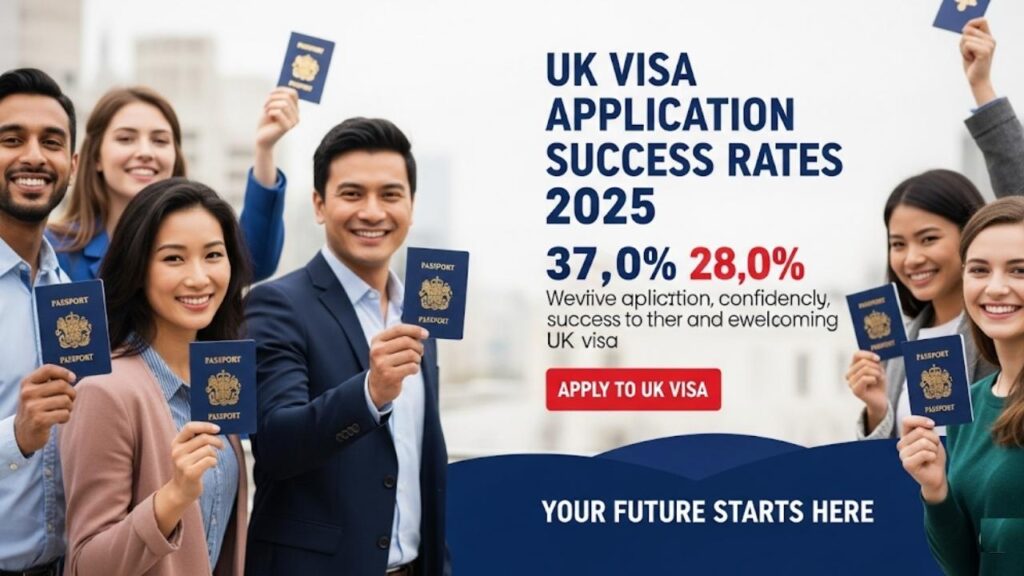Embarking on the journey to secure a UK visa can feel like navigating a complex labyrinth. As someone who has advised countless aspiring students and professionals, I understand the mix of excitement and apprehension that comes with this significant step. The latest data on UK visa applications May/June 2025 acceptance, denials, and holds offers crucial insights, and understanding these trends is your first step towards a successful application. This article will break down the recent statistics, shed light on what they mean for you, and provide actionable advice to boost your chances.

The UK remains a highly sought-after destination for study, work, and family reunification, drawing individuals from across the globe. Recent reports from the Home Office, specifically the “Monthly entry clearance visa applications, May 2025,” indicate shifts in application volumes across various categories. While overall numbers can fluctuate due to policy changes and global events, a clear understanding of current trends can empower you to submit a strong and compelling application.
UK visa applications May/June 2025
| Key Fact | Detail/Statistic (May 2025) |
| Student Visa Applications (Main Applicants) | 425,200 in the year ending May 2025, down 9% from year ending May 2024. However, a recent surge of 18,500 applications in May 2025 alone (up 19% year-on-year for that month). |
| Student Dependent Visa Applications | 19,200 in the year ending May 2025, an 87% decrease from the year ending December 2023, following January 2024 rule changes. |
| Health and Care Worker Visa Applications | 1,600 applications in May 2025, a significant drop from 18,300 in August 2023. |
| Skilled Worker Visa Applications | 3,600 applications in May 2025, down from a stable 6,000 monthly average. |
| Standard Processing Time (Outside UK) | Most non-settlement visas aim for a 3-week decision. |
The journey to the UK, whether for study, work, or family, is a significant chapter in many lives. The UK visa applications May/June 2025 data offers a snapshot of current trends, indicating areas of increased scrutiny and highlighting the importance of thorough preparation. While policy changes are part of the landscape, the core principles of a strong application remain constant: accuracy, completeness, and genuine intent. Start preparing your application now, focusing on every detail, and approach the process with confidence. Your UK adventure is within reach!
Understanding Acceptance Rates: What the Numbers Tell Us
While specific May/June 2025 overall acceptance rates aren’t explicitly published as a single figure by the Home Office, we can infer trends from the application volumes and historical data. For instance, the UK student visa acceptance rate has historically been very high, with a reported 98% success rate in 2024, meaning only about 2% of applications were rejected. This high success rate largely holds true as long as applicants meet all eligibility criteria and submit accurate documentation.
The significant drop in Health and Care Worker visa applications and Skilled Worker visa applications suggests increased scrutiny and policy changes affecting these routes. The Home Office is tightening regulations, particularly around employer compliance for sponsored visas, and for student visas, the ability to bring dependants has been severely restricted.

Common Reasons for Denials and How to Avoid Them
Even with generally high acceptance rates for certain categories like student visas, denials do occur. In my experience advising applicants, many rejections stem from preventable errors. Here are the most common pitfalls and how to steer clear of them:
- Incomplete or Inaccurate Documentation: This is perhaps the most frequent reason for denial. Every single document requested must be provided, and all information must be consistent and truthful. Double-check your application form against your supporting documents.
- Insufficient Funds: For student visas, proving you have sufficient funds to cover your tuition and living expenses is paramount. The UK government sets specific financial requirements. For example, international students applying for a UK Student Visa in 2025 need to demonstrate 11% more financial resources than previous guidelines. Ensure these funds have been held in your account for a minimum of 28 consecutive days before applying.
- Lack of Genuine Intent: For visitor visas or certain temporary work routes, the Home Office assesses whether your stated purpose for coming to the UK is genuine. Providing a clear, coherent travel itinerary, evidence of ties to your home country, and a plausible reason for your visit is crucial.
- Previous Immigration Breaches: Any history of overstaying a previous visa, providing false information in past applications, or criminal convictions will significantly impact your current application. Transparency is key; if there are issues, it’s often better to address them proactively and honestly, providing explanations where possible.
- Incorrect Visa Category: Applying for the wrong type of visa can lead to an automatic rejection. Thoroughly research the visa category that best fits your purpose of travel or study.
Understanding Application Holds and Processing Times
Sometimes, applications aren’t outright denied but placed on hold for further checks or information. This can be frustrating, but it’s part of the process. UK visa processing times 2025 vary significantly by visa type and whether you apply from inside or outside the UK.
- Standard Processing: Most non-settlement visas applied for outside the UK aim for a decision within 3 weeks. However, inside the UK, processing times can extend to 8 weeks for many categories like student visas.
- Settlement Visas: These typically take longer, with a target of 12 weeks for applications made outside the UK and up to 24 weeks for complex cases.
- Factors Causing Delays: Applications can take longer if the information is not accurate, requires further consideration, or if additional evidence or an interview is needed. Increased visa demand or technical outages can also contribute to delays.

Navigating Policy Changes: A Proactive Approach
The UK government has been implementing significant changes to its immigration policies, particularly since late 2023 and into 2025. These changes aim to manage net migration and focus on attracting “high-skilled” talent.
- Dependant Rules for Students: As mentioned, the most impactful change for students is the restriction on bringing dependants, now generally limited to those pursuing postgraduate research courses or government-funded scholarships.
- Skilled Worker Salary Thresholds: For those seeking work visas, there’s an increased emphasis on higher salary thresholds. As of January 2025, first-time applicants for the UK Skilled Worker Visa may need to demonstrate an income of £38,700 for accommodation and other expenses, alongside employer sponsorship.
- Electronic Travel Authorisation (ETA): The UK is gradually rolling out its ETA scheme, a digital permission to travel for visitors from countries that do not currently require a visa for short stays. While not a visa, it’s an essential pre-travel requirement for eligible nationalities.
These changes underscore the importance of staying updated on official government guidance. “In my experience advising students, one common hurdle is outdated information. Always refer to the official GOV.UK website for the most current policy details,” I always tell my clients.
Empowering Your Application: Actionable Steps
Successfully navigating the UK visa application process requires diligence and a strategic approach.
- Read the Official Guidance Thoroughly: The GOV.UK website is your most reliable source. Do not rely solely on third-party websites or anecdotal advice.
- Gather All Required Documents Early: Create a checklist and start collecting documents well in advance. This includes financial proofs, educational certificates, employment letters, and identity documents.
- Ensure Financial Compliance: For student and work visas, meet the exact financial requirements and ensure funds have been held for the stipulated period.
- Craft a Clear Statement of Purpose (SOP) or Cover Letter: Clearly articulate your reasons for visiting, studying, or working in the UK, your ties to your home country, and your plans after your visa expires.
- Be Honest and Consistent: Provide accurate information across all parts of your application and supporting documents. Inconsistencies can raise red flags.
- Seek Professional Advice (Optional but Recommended): If your case is complex or you feel unsure, consider consulting an immigration solicitor or a reputable visa consultant. Their expertise can be invaluable in ensuring compliance and strengthening your application.
This commitment to detail and understanding the evolving landscape of UK immigration statistics May/June 2025 are your best assets. Remember, thousands of individuals successfully secure UK visas every year. With careful preparation and accurate information, you can be one of them.
UK Care Worker Visa Changes 2025: Your Complete Guide to Navigating the New Landscape
FAQ
Q1: What are the main factors influencing UK visa decisions in 2025?
A1: Key factors include complete and accurate documentation, demonstration of sufficient funds, genuine intent for visit/study/work, adherence to new policy changes (e.g., dependant rules for students, increased salary thresholds for skilled workers), and a clean immigration history.
Q2: How can I check the latest processing times for my UK visa application?
A2: The most up-to-date processing times are published on the official GOV.UK website under “Visa processing times: applications outside the UK” or “Visa processing times: applications inside the UK,” depending on your application location. These are updated regularly.
Q3: What should I do if my UK visa application is taking longer than the stated processing time?
A3: If your application has exceeded the published processing times and you haven’t been contacted by UKVI, you can reach out to UKVI directly. Ensure you have your application reference number ready. Avoid contacting them prematurely if your application is still within the stated timeframe.
Q4: Are there any new financial requirements for UK visas in 2025?
A4: Yes, for UK Student Visas, applicants in 2025 are generally required to demonstrate 11% more financial resources than in previous guidelines. Additionally, new Skilled Worker visa applicants may need to meet a higher income threshold of £38,700, along with employer sponsorship. Always verify the latest figures on the GOV.UK website.
Q5: Can I apply for a UK visa if I have a criminal record?
A5: While a criminal record can impact your application, it does not automatically lead to a denial. The Home Office assesses each case individually. It is crucial to be entirely honest about any past convictions in your application. Non-disclosure can lead to automatic refusal.










